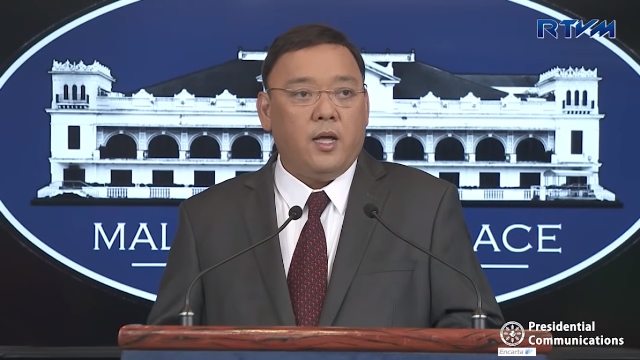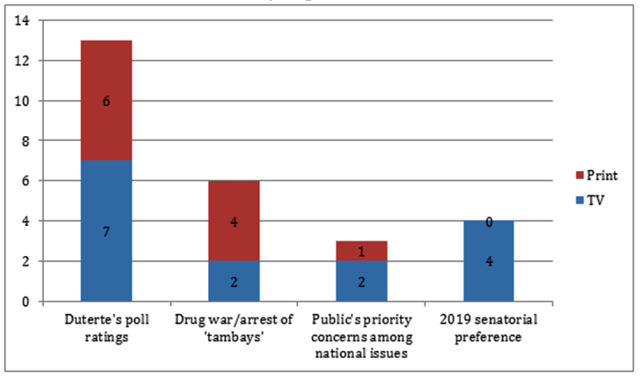Media Gloss Over Nuances in Recent Survey Results

Presidential Spokesperson Harry Roque talks about the recent surveys during a press briefing on September 27 | Screen grab from RTVM YouTube page.
POLLING FIRMS Social Weather Stations (SWS) and Pulse Asia closed the month of September with the release of the results of their latest surveys of public opinion on national issues, as well as the approval ratings of top government officials.
SWS’ Second Quarter 2018 Social Weather Survey, conducted from June 27 to 30 on 1,200 respondents, surveyed public opinion on the policies of the Duterte administration. The results of their surveys on the arrest of street idlers (“tambay”) and public satisfaction with the anti-illegal drug campaign were released on September 23, followed by those on a poll on police claims that those killed during anti-drug operations fought back or “nanlaban” on September 25. On September 29, the firm released its Third Quarter 2018 survey on the net satisfaction ratings of President Rodrigo Duterte.
Pulse Asia’s latest Ulat ng Bayan survey was conducted from September 1 to 7 with 1,800 respondents. The survey polled people’s preferences for senatorial candidates in the 2019 elections; the approval and trust ratings of top government officials and key government institutions; and on government performance on urgent national concerns. The findings were released in three parts on September 22, 25 and 27.
Most of the reports were quick to zero in on Duterte’s survey numbers, noting mainly the shifts in approval levels of the government. But media glossed over results on the public’s views on the campaign against illegal drugs.
CMFR monitored the leading Manila broadsheets Manila Bulletin, Philippine Daily Inquirer and The Philippine Star; the primetime newscasts 24 Oras (GMA-7), Aksyon (TV5), News Night (CNN Philippines) and TV Patrol (ABS-CBN 2); as well as selected news sites from September 24 to 30, 2018.
Polls in the news
The news accounts reporting the surveys were straightforward, but focused on Duterte’s poll numbers, with a total of 13 reports: six in print and seven on television. Other survey topics received less attention.
Media hardly provided the meaning of the survey numbers. They instead chose to quote government sources for their reactions.
Presidential Spokesperson Harry Roque, for instance, hailed the high satisfaction rating on the “war on drugs,” which was at 78% in the SWS poll, as indicative of “overwhelming support” from the Filipino people – a sentiment echoed by the Philippine National Police (PNP). But Roque dismissed the 60% of Filipinos who think the arrest of tambays is a violation of human rights. He also downplayed Duterte’s drop in approval ratings to 75% from the previous 88% in the Pulse Asia survey, claiming that the public had merely forgotten Duterte’s other achievements due to the soaring prices of commodities.
Some senators commented on their respective rankings in the Pulse Asia survey. A University of the Philippines political science professor explained the dominance of women candidates for senator in the poll as proof of Filipino approval of authoritative women figures in government. The other reactors were ordinary Filipinos and critics who either agreed or disagreed with the poll findings.
Missing the significant
Despite its significance, media failed to point out the critical shift in public opinion towards the government’s so-called “war on drugs.”
According to the SWS polls, 78% were satisfied with the government’s anti-illegal drug campaign, for a net satisfaction rating of +65 (very good). But another poll, also by the SWS, showed that 26% of Filipinos do not believe claims that the victims had fought back and were killed by the police in self-defense. As for the government’s anti-tambay campaign, 60% believe that the arrest of “loiterers” is in violation of human rights. These negative findings were not given as much attention by the media as Duterte’s numbers (Table 1).
With the exception of the Inquirer, the reports simply recalled the poll numbers with little or no context to explain what they mean. On September 25, the Inquirer report included the views of human rights groups which were critical of the survey results.
Cristina Palabay, secretary general of Karapatan, warned that the findings could mean that the public has been convinced that the drug war is an “effective antidote” to the country’s problems. Evangeline Hernandez, head of Hustisya, a group composed of families of victims of extrajudicial killings, said the poll did not reflect the sentiments of those directly affected by the government campaign against illegal drugs. Commission on Human Rights chairperson Jose Luis Gascon argued that the popularity of the anti-illegal drug campaign “cannot constitute a license” to trample on human rights.
The Inquirer also noted that the SWS did not explain whether “satisfied” and “dissatisfied” meant that the respondents approved or disapproved of the deaths in the drug campaign. (“Rights groups doubt satisfaction with drug war”)
Lacking the analysis
There is quite obviously a disconnect between the supposed satisfaction of the public with the “drug war” and their rejection of the police’s “nanlaban” narrative. Media could have examined this seeming disparity by asking SWS and other sources what this seeming contradiction means. The media could have pointed out how this echoes the findings of six earlier SWS surveys as early as 2016 that said Filipinos do not believe in the killing of suspects.
Moreover, the reports also failed to pay more attention to the nuances presented by the SWS net satisfaction poll released on September 29, specifically on Duterte’s “vulgar” pronouncements – the “God is stupid” comment and his rape remarks “because there are many beautiful women” in Davao City – which showed lower net satisfaction among those who called him “vulgar” (“good” +47 and +45) than those who said otherwise (“excellent +85 and “very good” +68).
The poll also found that 83% thought his “God is stupid” comment was vulgar, while 63% said the same about his rape remark.
The same survey also recorded a drop in net satisfaction among class ABC (down 25 points from “very good +66 to “good” +41) and class E (down 7 points from “very good” +52 to “good” +47). Pulse Asia’s September 25 poll reflected similar declines in Duterte’s approval and trust ratings, with the firm recording the lowest drop in class D at 74% approval ratings (down 13 points) and 71% trust (down 16 points).
What do these shifts in opinion mean for the government? What patterns in past polls suggest future survey results? Missing in the coverage were interviews with experts who could have helped look into and interpret these nuances.
In a previous monitor, CMFR pointed out that “Poll data can help the public and officials form an opinion or rethink their position on pertinent issues. But for the data to be useful, media must do more than just go by the numbers” (See “Understanding Survey Results: More than just Numbers”). Getting the news includes the responsibility of helping provide media audiences its meaning.

Leave a Reply